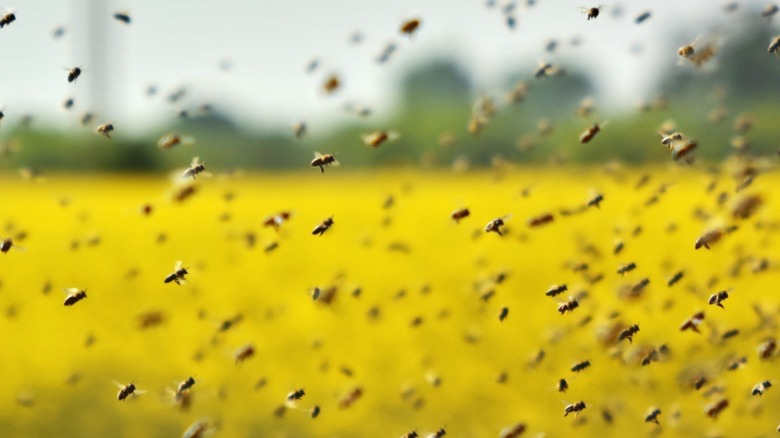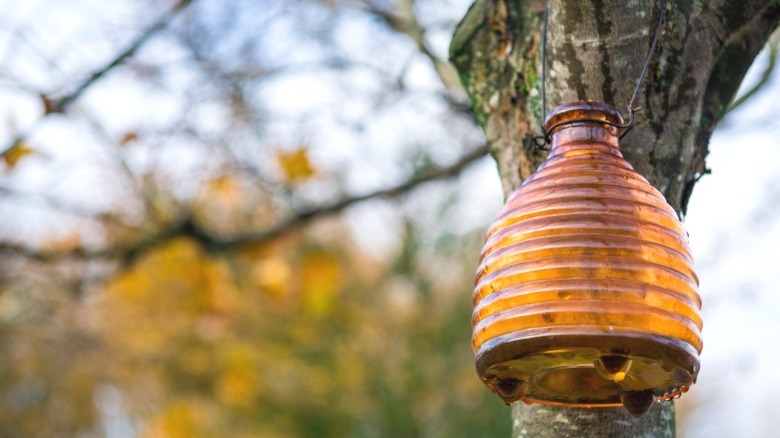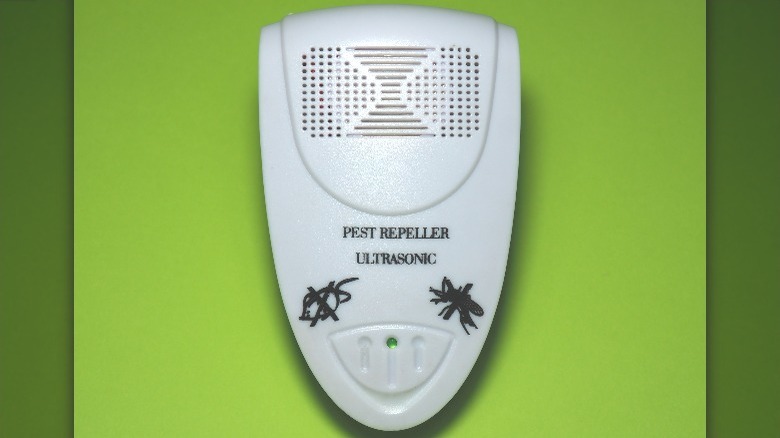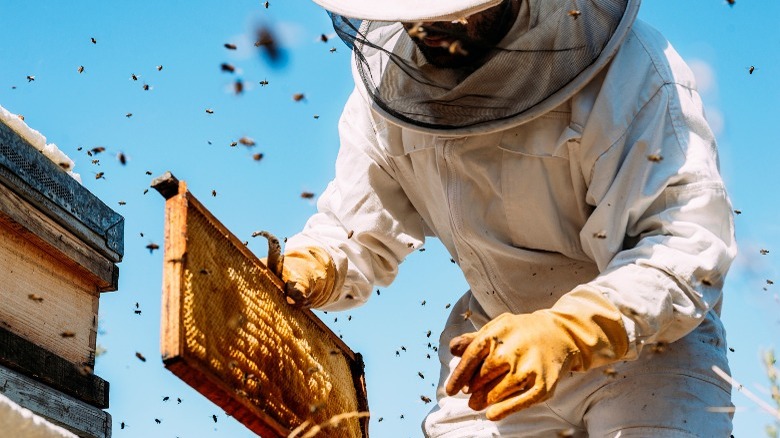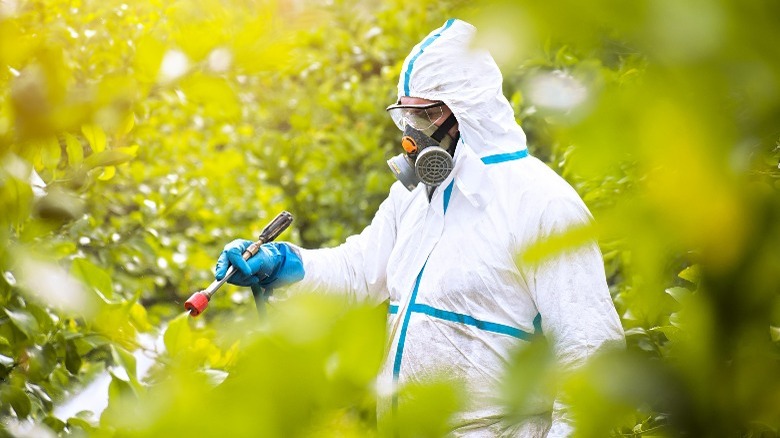8 Ways To Get Rid Of Bees
Bees are a crucial part of the natural environment. According to Pests.org, the honey bee is responsible for pollinating 70% of worldwide food crops, and our collective existence would surely suffer without them. However, though they are incredibly helpful, there are also occasions in which they are a nuisance. Most of us are familiar with a bee's painful sting, and for some individuals the venom in that sting can cause a life-threatening allergic reaction.
There are also bee species such as carpenter bees that bore into wood and can cause significant and expensive damage to your home. In these cases, you might need to get rid of bees. Bees are an endangered species in the United States, and removal methods should take this into account. Nearly all of the strategies listed here are non-toxic to humans, naturally derived, and most importantly, preserve the life of the bees. Read on to find out which method can best help you.
1. Smoke
Smoke is incredibly effective in driving away bees. In the wild, smoke alerts the bees that their habitat is burning and in response, they gather as much honey as they can before migrating to a new location. According to Hobby Farms, beekeepers actually smoke bees before collecting honey, because the bees do not sting while they are preoccupied with gathering supplies and preparing to flee to safety.
Since it's unlikely you have a beekeeper's smoker on hand, you'll need to build a small, safely contained bonfire to produce smoke. Use dead leaves, cardboard, newspaper, or small twigs as fuel. The best time to smoke the hive is after dark, when the bees are settled inside. Keep a working fire extinguisher on hand, and consider advising your neighbors and the local fire department of your plan. Migration after smoking can take roughly 8 to 10 hours, but this method should permanently drive the bees away.
2. Citronella
Most people are familiar with using citronella to ward off mosquitos, but did you know it can also help you repel bees? According to MyMove, the strong smell of citronella is repugnant and overwhelming to bees. Other strong scents such as peppermint, cinnamon, bitter almond, and cucumber have a similar effect.
Citronella candles are commonly used to repel insects in outdoor spaces, and the ingredient is often included in natural bug spray formulas. You can also add a few drops of essential oils to water and spray any areas you wish to rid of bees. It is non-toxic to humans, and because it is derived from plants, it should have no ill effects on the surrounding environment. Unfortunately, it must be continually applied or in use to be effective, and is not a permanent solution to eradicating bees. You can however, try planting mint, citronella, or citronella-scented geraniums in your garden for a more long-lasting effect.
3. Bee trap
If you're dealing with an indoor infestation or wish to otherwise avoid disrupting the affected area, you could try a bee trap. A bee trap works by luring unsuspecting insects with a sweet nectar-like solution. The bees are drawn into the vessel, but the bottleneck shape prevents them from escaping. They can be left to perish in the trap, or released to another area; we suggest the latter.
Pests.org explains how you can make your own DIY trap at home with just a 2 liter plastic bottle, scissors, and a stapler. Cut the bottle horizontally all the way around, where the sides slope upwards to the top. Remove the top piece and cover the bottom of the bottle with 1/2 inch of sweet liquid. Place the top piece upside-down in the bottle to form a funnel shape. Staple to secure together, and wait for curious bees to fall for your trap. This strategy won't eradicate the bees, but it can reduce their numbers.
4. Vinegar spray
Vinegar is another naturally-derived method of getting rid of bees. Like other strategies listed here, the strong smell of vinegar repels the bees. Vinegar, however, can be fatal to the insects when applied in large doses, according to MyMove. To simply repel bees without harming them, mix equal parts white vinegar and water, and place containers of the mixture in the affected areas. To exterminate the bees (if they're in your home, for example), pour the mixture into a spray bottle and spray directly onto the hive, and areas they frequently visit. Repeat if necessary.
It is unfortunate any time bees must be exterminated, but as far as methods go, vinegar is non-toxic to humans and shouldn't otherwise harm the surrounding environment. Vinegar can also be used safely within the home, for indoor bee infestations. It also has the advantage of being relatively inexpensive, and useful in a variety of other cleaning and home improvement projects.
5. Ultrasonic pest repellant
A far more modern method of pest control is to use an ultrasonic pest repeller. According to World Birds, these electronic devices work by emitting sound waves that repel pests but are undetectable to humans. Bees "hear" with their antennae and the subgenual organs in their legs that detect sound wave vibrations in the air. These organs enable the bees communicate and work together as a hive. The ultrasonic devices repel the bees by disorienting and disrupting their communication, making it difficult for them to effectively coordinate and ultimately driving them away.
There are both battery powered and plug in models available, as well as solar-powered devices for outdoor use. In addition to being incredibly easy to use and install, these devices are non-toxic and non-fatal to bees, and any other pests. Reports on effectiveness, however, do vary, so be sure to check reviews and be prepared to need a back-up method.
6. Garlic
Garlic is another natural method of repelling bees. Similar to the effects of essential oils, the pungent smell irritates the bees and causes them to relocate elsewhere. However, unlike the other natural methods mentioned in this article, garlic can in fact cause harm to the bees. According to the Entomological Society of America, research has shown that garlic extract is toxic to bee larvae, and causes symptoms such as lethargy and low body mass in adult worker bees.
To get rid of bees using garlic, you'll need two garlic bulbs, and a bowl with 1/2 cup of boiled water. Peel the garlic cloves and chop them into a fine mince, then place in the hot water to steep overnight. The next day, strain the garlic out and fill a spray bottle with the strained liquid. Spray the concoction on plants the bees feed from, or directly on their hive if absolutely necessary.
7. Call a Beekeeper
If you find yourself overwhelmed and unsure of how to deal with a honeybee hive on your property, try calling a local beekeeper in your area. Beekeepers are experienced in relocating hives to protect both the bees and the hive structure itself, as Pest Control Hacks explains. They can either relocate the hive to another area of your property, or transfer the bees to an apiary where they can happily produce honey without disturbing any people.
Beekeepers will carefully disassemble the hive, cutting the honeycombs to fit into wooden frames that slide into a bee box. They will then transfer the queen to the new hive, and the rest of the colony will follow. A beekeeper may relocate the bees for free, or charge a fee similar to that of an exterminator. This option is safe for both humans and the bees, and beneficial to the environment as well.
8. Call an exterminator
If all else fails, you can always call a pest control professional. They are experienced and well-equipped to determine the best method to safely get rid of all types of bees, explains Terminex. Insecticide can be toxic, and some people are very allergic to bee stings, so it is sometimes safer and smarter to allow a professional to handle things rather than put yourself at risk. They may require you to be home and charge a fee, but otherwise this method is hassle-free.
An exterminator will also be able to educate you and provide recommendations on how to prevent future infestations and pest problems. For example, avoid leaving food out, and be sure to store it properly. While citronella and peppermint can repel bees, certain floral perfumes or fragrances may attract unwanted attention. It's also a good idea to regularly check for openings in the exterior of your house and repair any holes, especially in any screens, doors, windows, or garage entrances.
